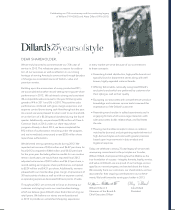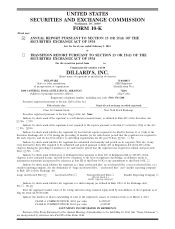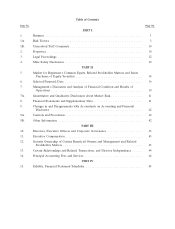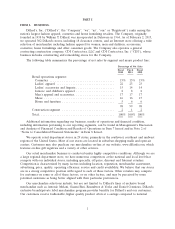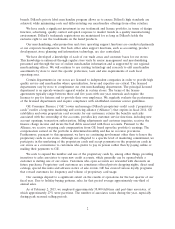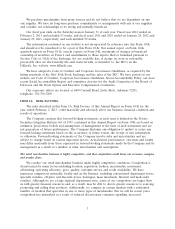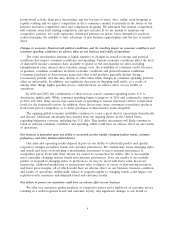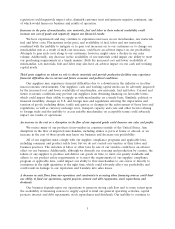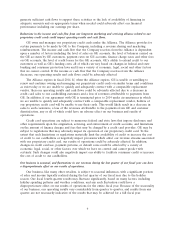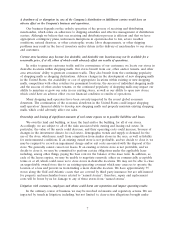Dillard's 2012 Annual Report Download - page 12
Download and view the complete annual report
Please find page 12 of the 2012 Dillard's annual report below. You can navigate through the pages in the report by either clicking on the pages listed below, or by using the keyword search tool below to find specific information within the annual report.various consumer protection and employment laws. Additionally, we may be subject to employment-
related claims alleging, discrimination, harassment, wrongful termination and wage issues, including
those relating to overtime compensation. We are also susceptible to claims filed by customers alleging
responsibility for injury suffered during a visit to a store or from product defects. These types of claims,
as well as other types of lawsuits to which we are subject from time to time, can distract management’s
attention from core business operations and impact operating results, particularly if a lawsuit results in
an unfavorable outcome.
Our profitability may be adversely impacted by weather conditions.
Our merchandise assortments reflect assumptions regarding expected weather patterns and our
profitability depends on our ability to timely deliver seasonally appropriate inventory. Unexpected or
unseasonable weather conditions could render a portion of our inventory incompatible with consumer
needs. For example, extended periods of unseasonably warm temperatures during the winter season or
cool weather during the summer season could render a portion of the Company’s inventory
incompatible with those unseasonable conditions. Additionally, extreme weather or natural disasters,
particularly in the areas in which our stores are located, could also severely hinder our ability to timely
deliver seasonally appropriate merchandise. For example, frequent or unusually heavy snowfall, ice
storms, rainstorms or other extreme weather conditions over a prolonged period could make it difficult
for the Company’s customers to travel to its stores and thereby reduce the Company’s sales and
profitability. A reduction in the demand for or supply of our seasonal merchandise or reduced sales
due to reduced customer traffic in our stores could have an adverse effect on our inventory levels,
gross margins and results of operations.
Natural disasters, war, acts of terrorism, other armed conflicts, and public health issues may adversely impact
our business.
The occurrence of, or threat of, a natural disaster, war, acts of terrorism, other armed conflicts,
and public health issues could disrupt our operations, disrupt international trade and supply chain
efficiencies, suppliers or customers, or result in political or economic instability. If commercial
transportation is curtailed or substantially delayed our business may be adversely impacted, as we may
have difficulty shipping merchandise to our distribution centers, fulfillment centers, stores, or directly to
customers. As a result of the occurrence of, or threat of, a natural disaster or acts of terrorism in the
United States, we may be required to suspend operations in some or all of our stores, which could have
a material adverse impact on our business, financial condition, and results of operations.
Increases in the cost of employee benefits could impact the Company’s financial results and cash flows.
The Company’s expenses relating to employee health benefits are significant. Unfavorable changes
in the cost of such benefits could impact the Company’s financial results and cash flows. Healthcare
costs have risen significantly in recent years, and recent legislative and private sector initiatives
regarding healthcare reform could result in significant changes to the U.S. healthcare system. Many of
our employees who currently choose not to participate in our healthcare plans may find it more
advantageous to do so when recent changes to healthcare laws in the United States become effective in
2014. Such changes include potential fees to persons for not obtaining healthcare coverage and being
ineligible for certain healthcare subsidies if an employee is eligible for healthcare coverage under an
employer’s plan. If a large portion of current eligible employees who currently choose not to participate
in our plans choose to enroll when or after the law becomes effective, it may significantly increase our
healthcare coverage costs or we may not be able to offer competitive health care benefits to attract and
retain employees, either of which could have an adverse effect on our reputation and have a negative
impact on our financial results.
8


